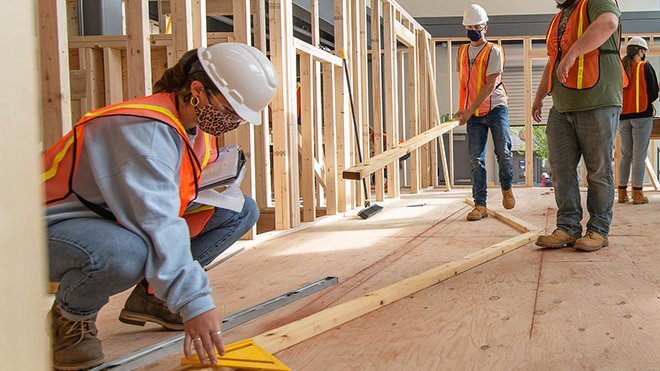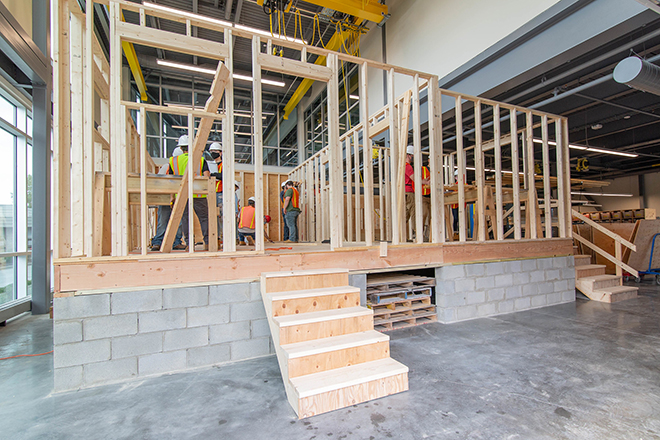Construction Management Students Build House in New SECCM Labs Building
Advanced Construction Materials and Methods Lab students are assembling and disassembling a small, to-scale single-family home in the heart of RWU’s Bristol campus for the first time, in the new SECCM Labs building.

BRISTOL, R.I. -- Walking into the Materials and Methods of Construction Lab, located on the first floor of the new SECCM Labs Building, is like walking onto a construction site. Students wearing safety goggles and vests, hardhats, and facemasks, are busily constructing a life-size single-family house.
“Putting things together and building is what I have always enjoyed doing. Going in that lab is honestly fun each week. It is truly hands-on,” said Greg Tocket, a sophomore Construction Management major.

This year’s project is taking shape in the heart of the Bristol campus, in RWU’s new SECCM Labs building, for the first time. Students are making the most of the new lab building's innovative technology, including the ceiling-mounted, two-ton crane, which Associate Professor of Construction Management Michael Emmer uses to teach crane safety procedures and use.
“Now, the students don’t have to drive offsite or catch the shuttle. Logistically it’s a lot better this way. We have more control over the building because we own it,” said Emmer.
Building a house from the foundation up teaches students in the Advanced Construction Materials and Methods Lab to understand all the resources – material, equipment, and people – it takes to successfully complete a construction project. From the foundation to the roof, students are involved in every step of the building process. Windows, doors, drywall, and even plumbing and electrical work are included in the project.
“We’re not trying to make the students carpenters or plumbers or masons. They are learning about managing those resources,” said Emmer. “They approach it from a different perspective. When they get out there in their career, the scale of what they are doing is going to be exponentially increased.”

The course is split into six sections of 10 to 13 students. Building tasks are divided so that each group does the same activity each week, collaboratively contributing to the construction. Small groups allow each student to be actively involved with the lab at all times while maintaining a safe work site.
Once they are done building, students will prepare a comprehensive deconstruction plan that identifies which materials can be reused or recycled, with a goal of minimizing waste. Then, they will take the house apart, step-by-step.
“Everything is screwed in, so we can take the screws out and reuse them. The vast majority of the materials are reused. They will be used for the spring lab, which is a whole different course," Emmer said. "We are pretty good at reusing materials. We don’t throw a lot away.”
Many of the students in the Construction Management program have family in the construction business. Others are drawn by the starting salaries in the construction management field, which averaged $68,000 last spring. Construction is a dynamic, growing business, and families and students are reassured by the strong success rates that RWU’s Construction Management alumni find after graduation.
“One hundred precent of students find jobs in the field within six months of graduation every year,” said Emmer. “Even in the recession of 2009 through 2012, every student got a job within six months. In the good times, students are getting two or three offers and have to decide which offer to pick.”